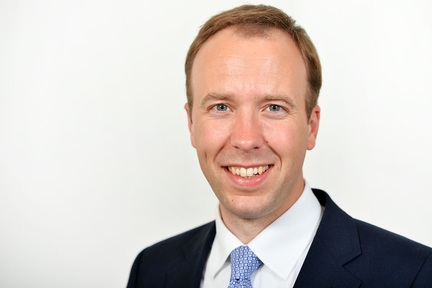Matt Hancock has seen 22 hospitals but only three care homes
Health and Social Care Secretary Matt Hancock has visited only three care homes, since starting his job in July last year, but has made trips to see 22 hospitals.

The stark contrast statistically between the health secretary’s hospital visits and trips to care homes has drawn criticism from older people’s charities and the care sector who say the truth highlights just how much of a Cinderella service social care is when compared with the NHS.
Mr Hancock’s few care home visits were revealed in Westminster on 8 February. In a written parliamentary question, Diana Johnson, the MP for Kingston Upon Hull North, asked which care homes the health secretary 'has visited in an official capacity' since July last year.
She was told by care minister Caroline Dinenage, Mr Hancock had seen just three.
On 19 July 2018, Mr Hancock visited Bridgeside Lodge Residential Care Centre in Islington, London, two months later on 10 September he visited Westbury Fields Retirement Village in Bristol. This was followed by a visit on 23 November to Meadow View Residential and Community Care Centre in Matlock.
In contrast, care minister Caroline Dinenage was reported to have visited three care homes in just one week last year.
In written response to a parliamentary question from Jonathan Ashworth, the MP for Leicester South, Ms Dinenage stated on 30 January that Mr Hancock had visited 22 hospitals since July 2018, when he took up the job of health secretary.
In Mr Hancock’s first speech as health secretary made on 20 July 2018, In it he said: “With demands rising, we must find a way to make health and care – by which I mean the whole health and social care system – sustainable for the long term.”
But the nation’s elderly and disabled are still waiting for the publication of a sustainable blueprint for social care in the form of a green paper, while the NHS’ long-term plan was published at the start of this year.
When Diana Johnson asked how much money the Department of Health and Social Care has spent on the green paper in the nearly two years (7 March 2017), since it was announced, the Department was unable to say.
Answering for Mr Hancock, Ms Dinenage stated: 'We are unable to provide the information requested as it could only be obtained at disproportionate cost.'
Green paper is ’Crossrail’ of social care
With its continual delays and unknown costs, the green paper has been described as the “Crossrail” of social care. Subject to delays, Crossrail is the 118-km railway line being developed in London, linking Berkshire, Buckinghamshire and Essex.
George McNamara, director of policy and influencing at Independent Age, the older people’s charity, said: “We have now been waiting 708 days for these reforms and older people are bearing the brunt.
"The green paper is fast becoming the Crossrail of the health and social care sector, with repeated delays and indeterminate costs. “It’s astounding that the Department of Health and Social Care doesn’t seem to know how much has already been spent on the social care green paper. Not only that, but it seems that finding out what people actually need is not a top priority.”
In a response to the MP for Kingston Upon Hull North’s on how many ministerial meetings had taken place about the green paper, Ms Dinenage stated: “Since the Department became responsible for publishing the green paper in January 2018, ministers from the Department have been in regular communication with ministers from other government departments and the Prime Minister’s Office to discuss the development of the green paper".
Ms Dinenage confirmed there have been five meetings with the social care 'expert group' set up by the government to advise on the green paper.
The expert group includes, among others, Caroline Abrahams (co-chair of the Care and Support Alliance and charity director of Age UK) Kate Barker (former chair of the King’s Fund Commission on the Future of Health and Social Care in England), Dr Eileen Burns (President of the British Geriatrics Society), Professor Paul Burstow (chair of the Social Care Institute for Excellence) and Andrew Dilnot (warden of Nuffield College Oxford).
An estimated 1.4 million older people are currently struggling with unmet care needs. Mr McNamara added: “We need radical reform of the system, and this should have included engaging with a number of external stakeholders, including older people themselves. The fact this has not happened is deeply worrying."
Latest News
 29-Jul-24
Dementia Bus gives carehome.co.uk staff insight into life with dementia
29-Jul-24
Dementia Bus gives carehome.co.uk staff insight into life with dementia
 01-Mar-24
Find out the top care homes in 2024
01-Mar-24
Find out the top care homes in 2024
 21-Mar-23
UK's top care homes in 2023 revealed
21-Mar-23
UK's top care homes in 2023 revealed
 03-Jan-23
carehome.co.uk launches free care helpline
03-Jan-23
carehome.co.uk launches free care helpline
 13-Dec-22
5 mins with Emily Whitehurst, chief operating officer for Constantia Healthcare
13-Dec-22
5 mins with Emily Whitehurst, chief operating officer for Constantia Healthcare